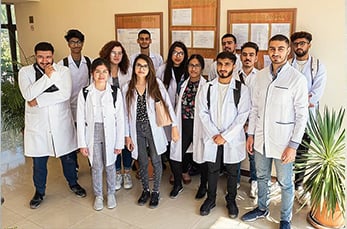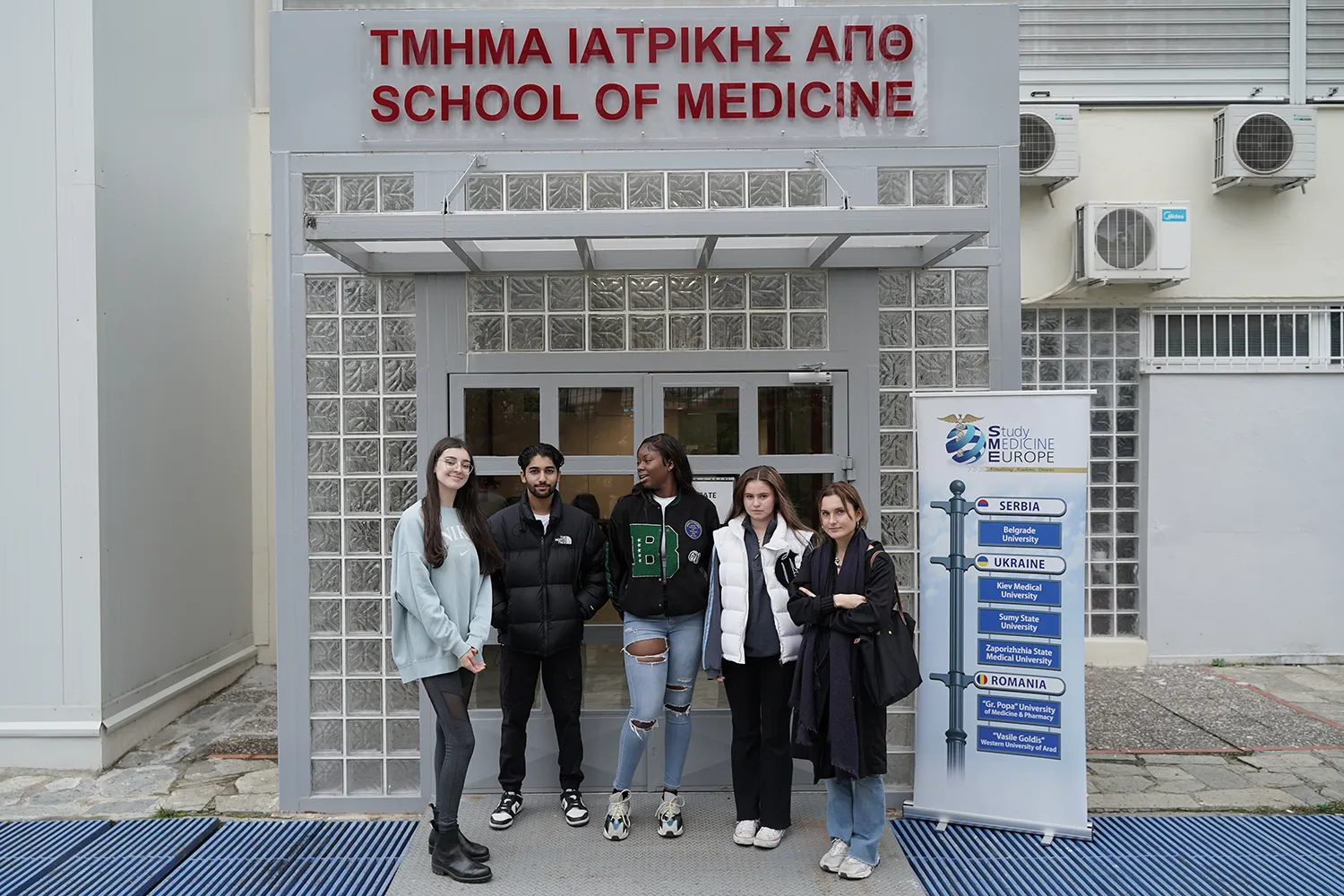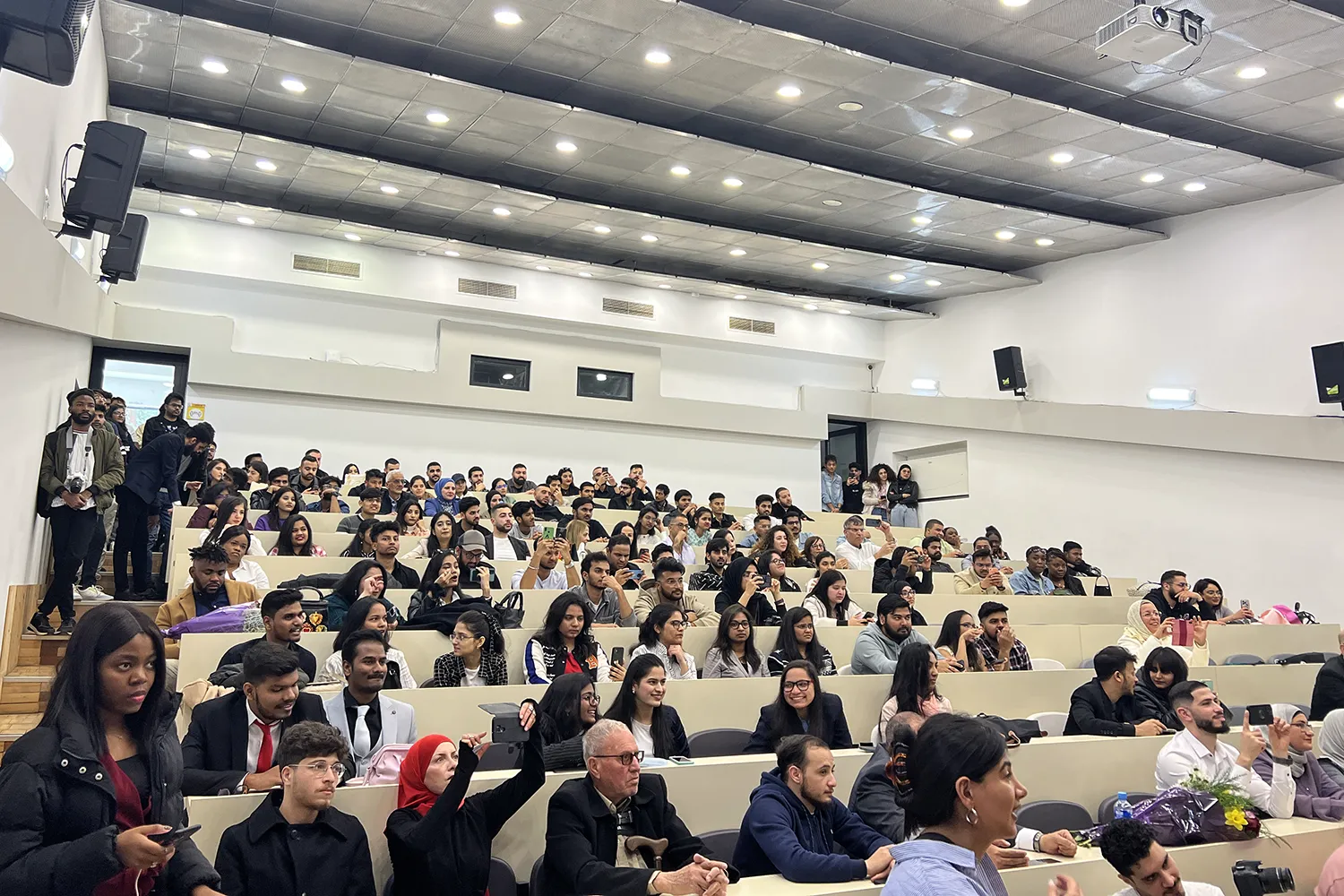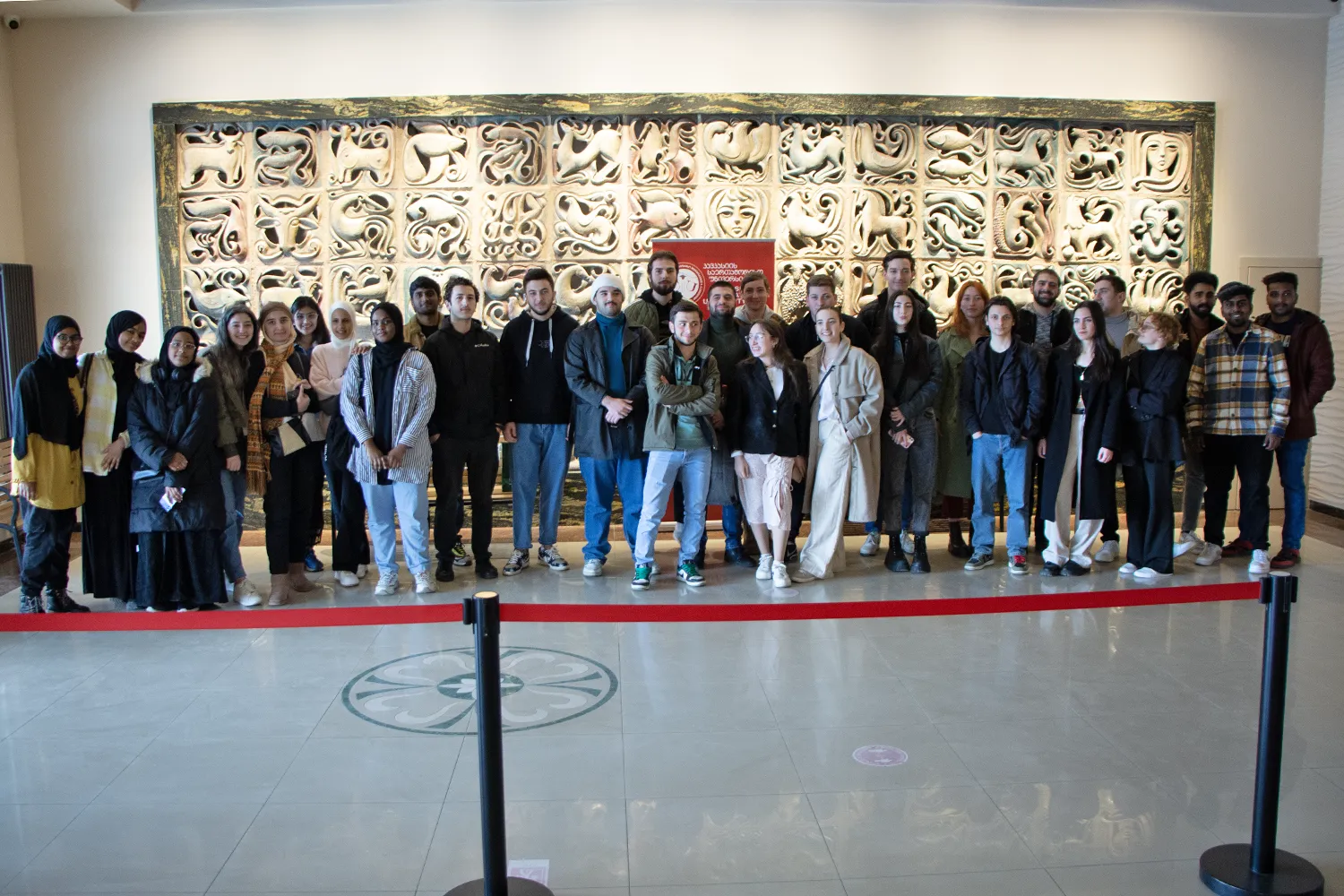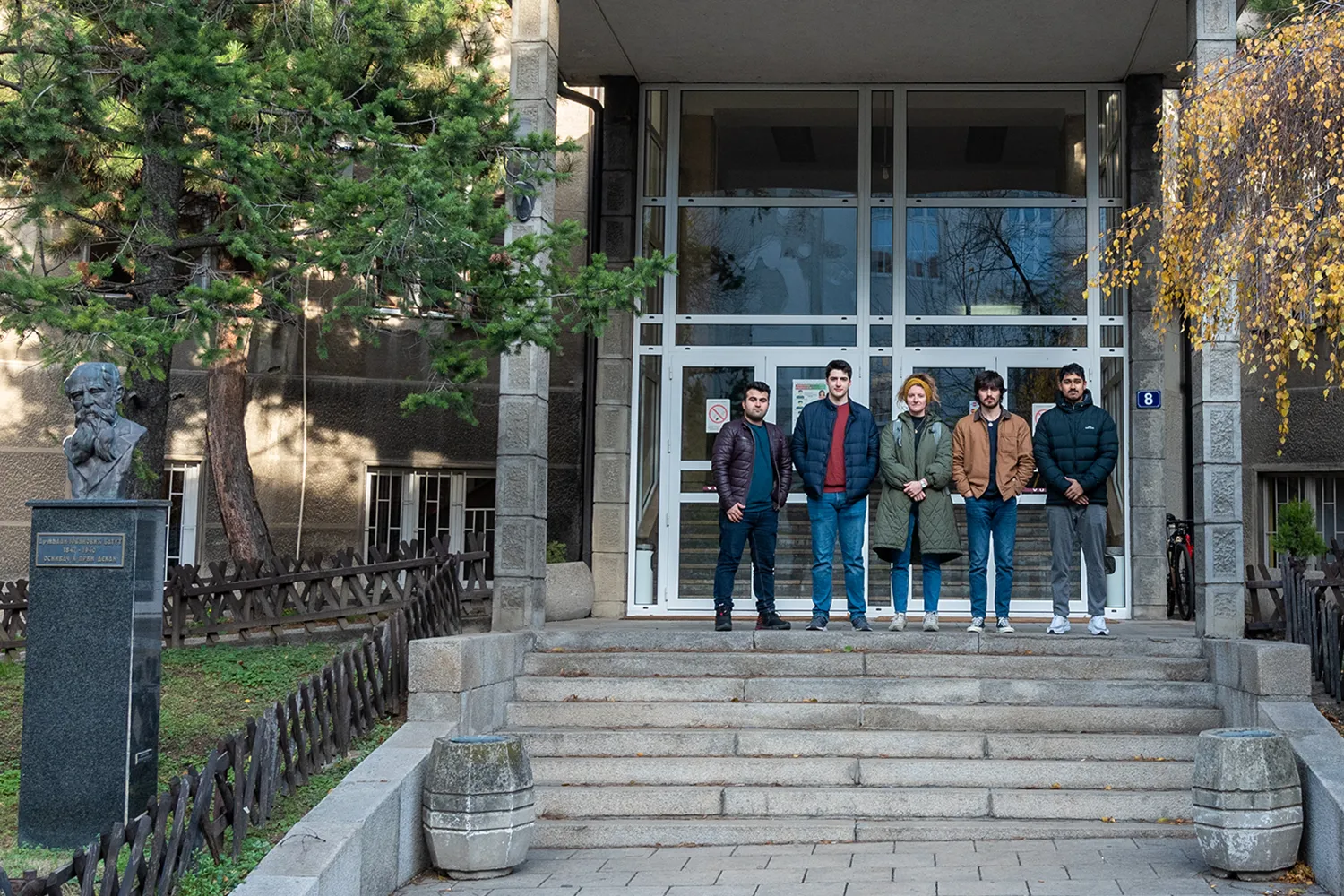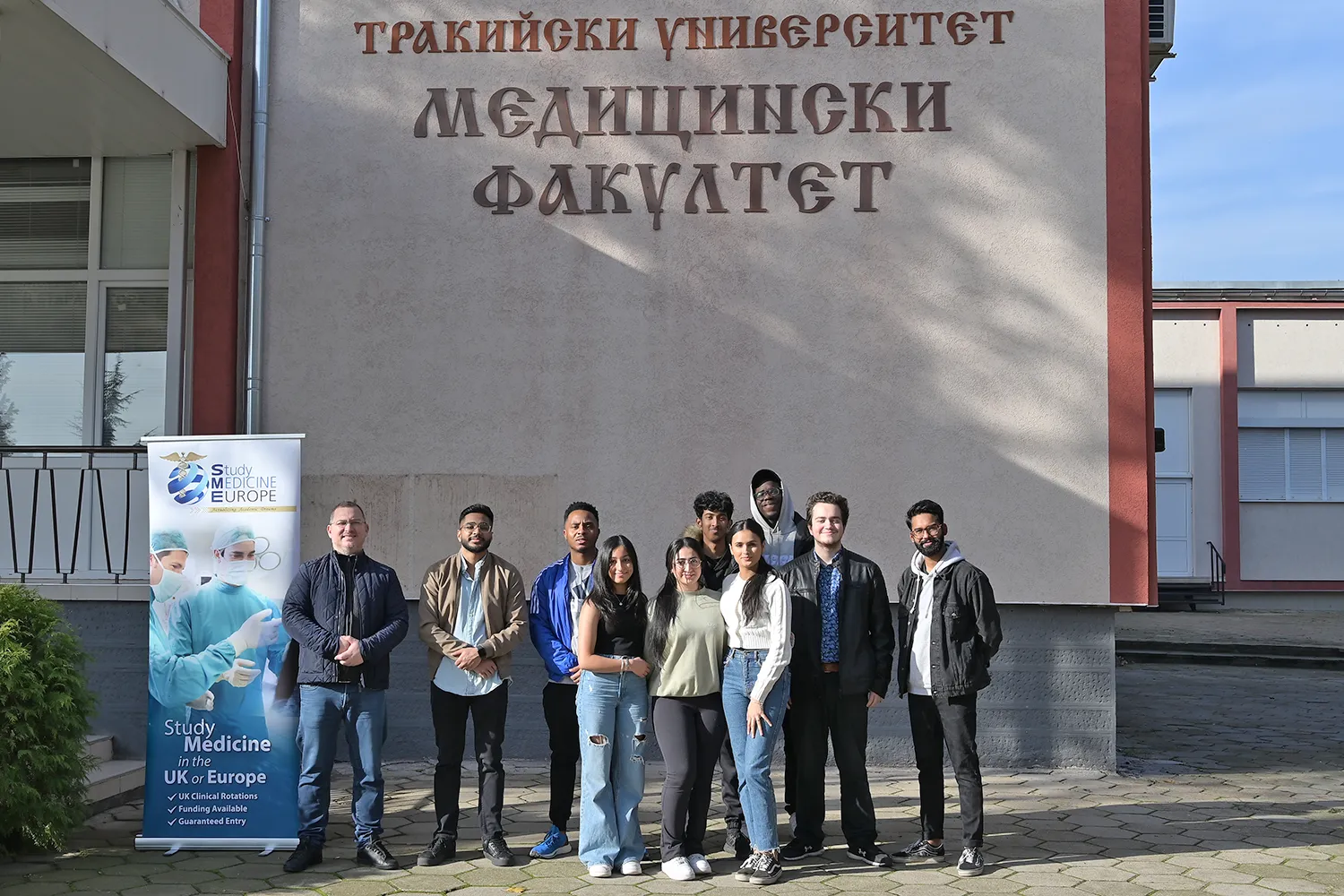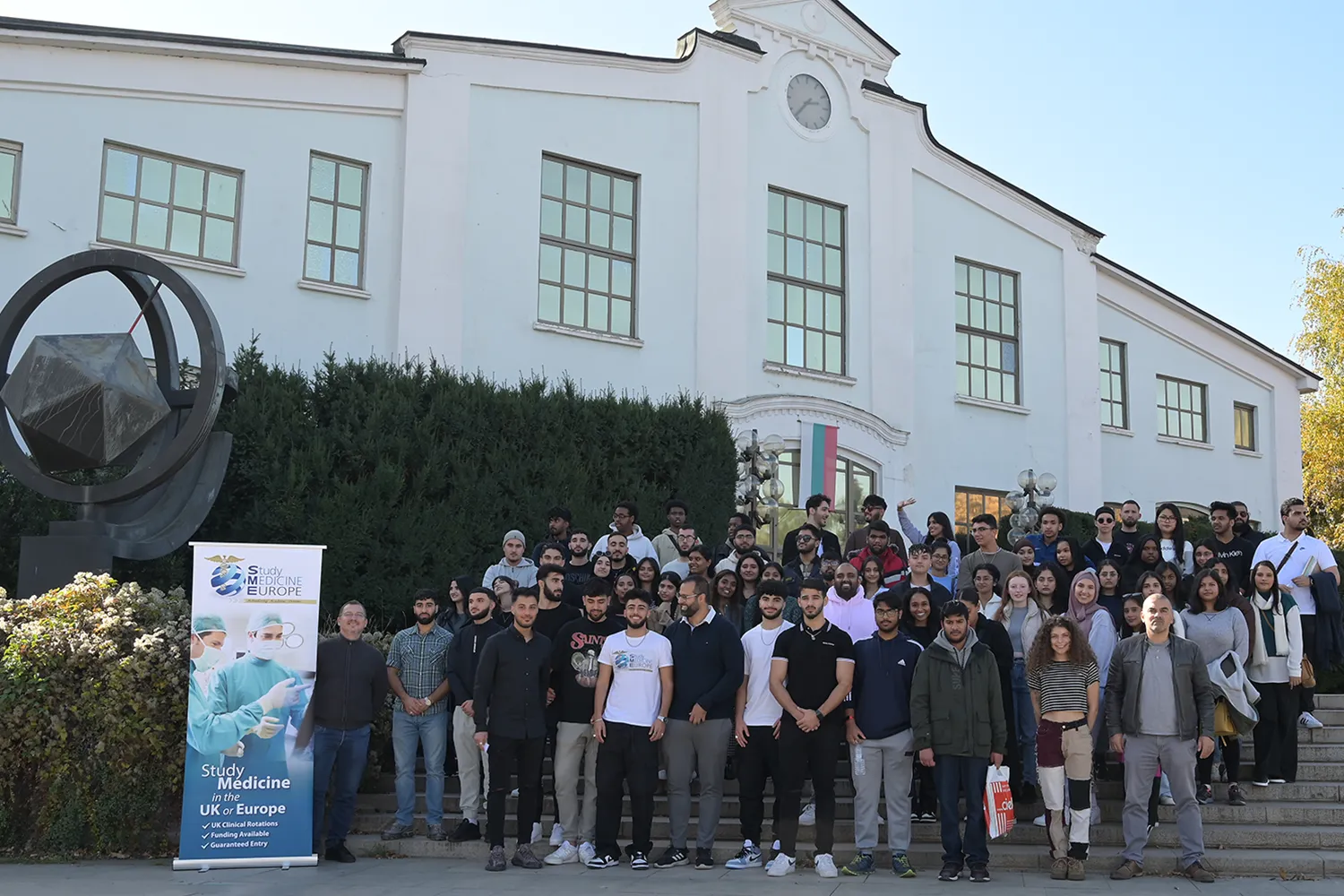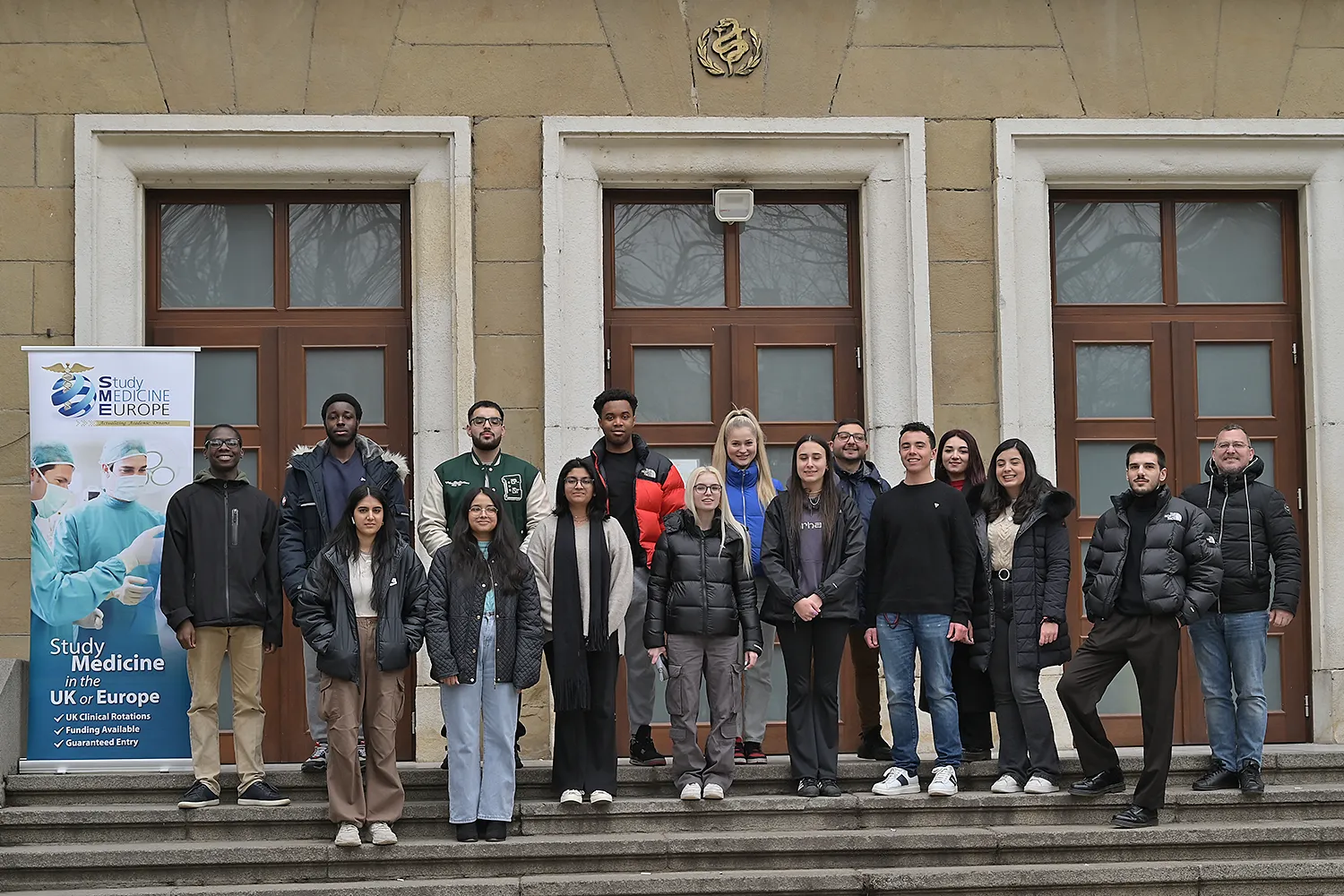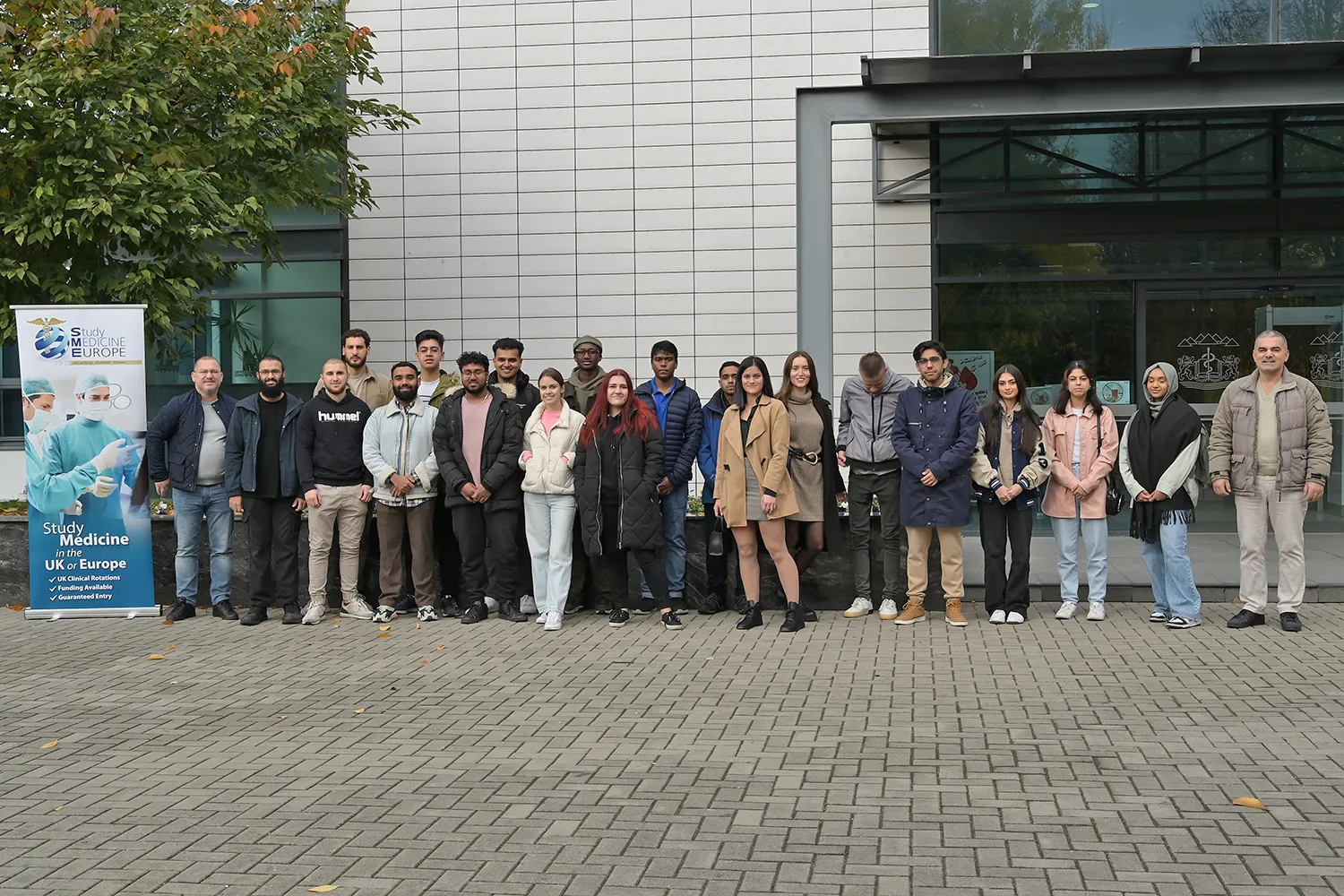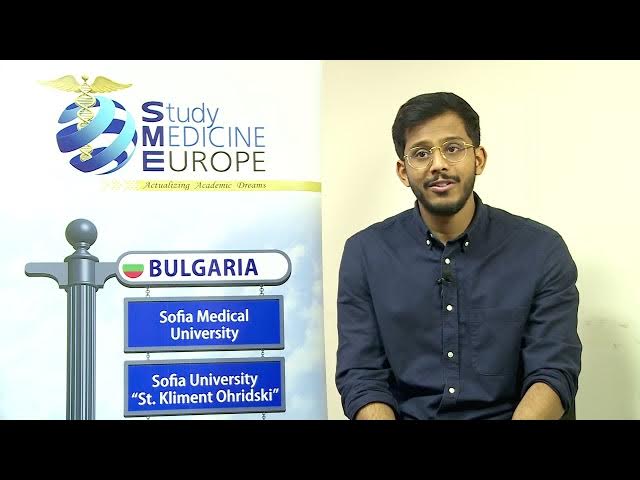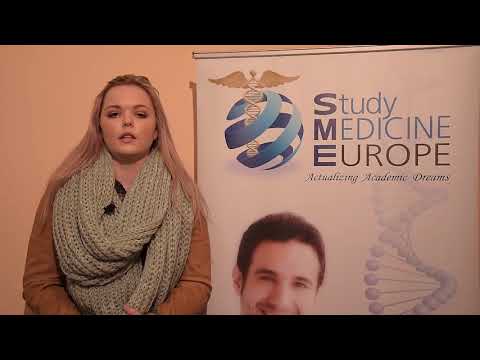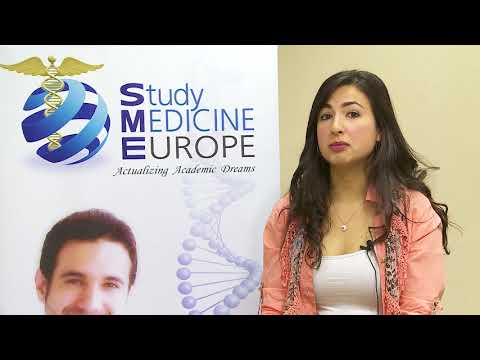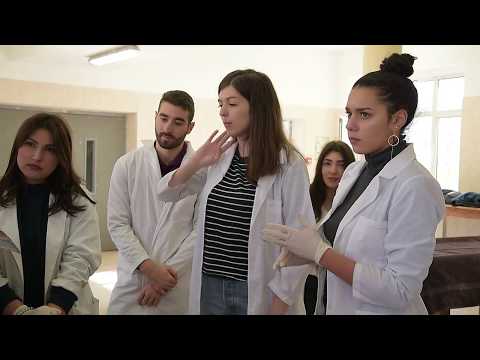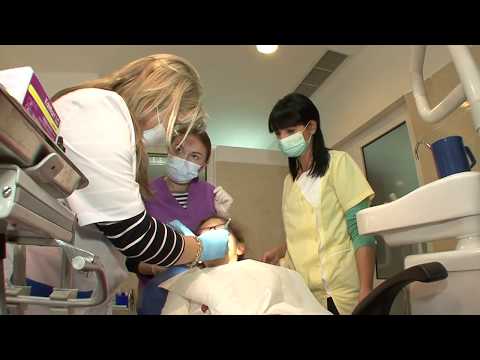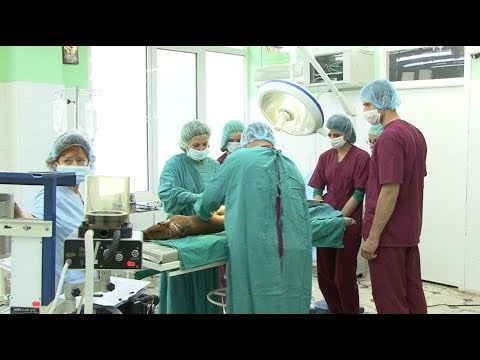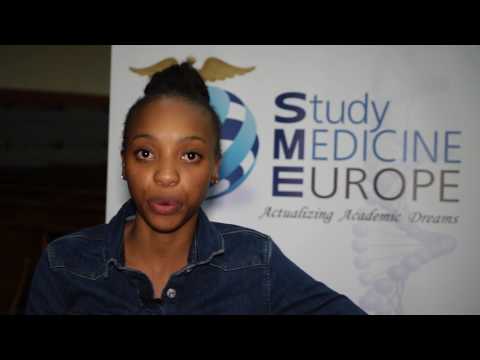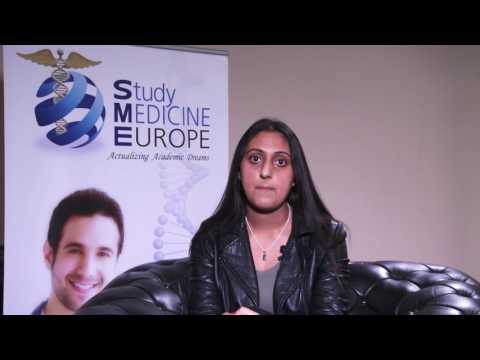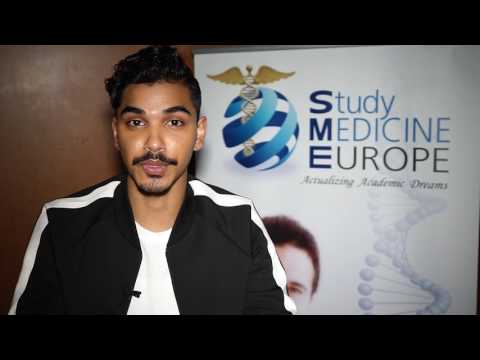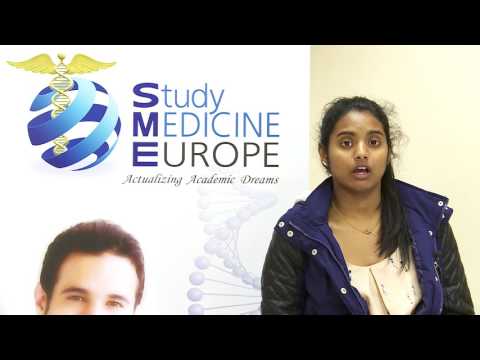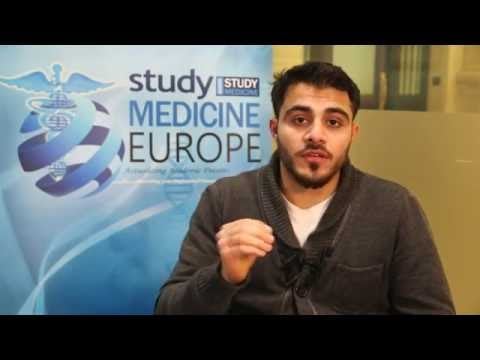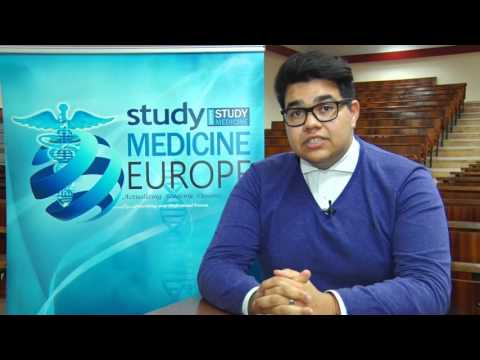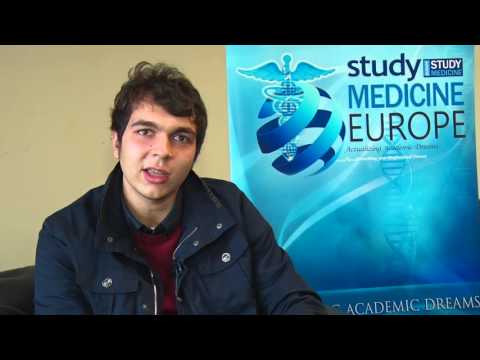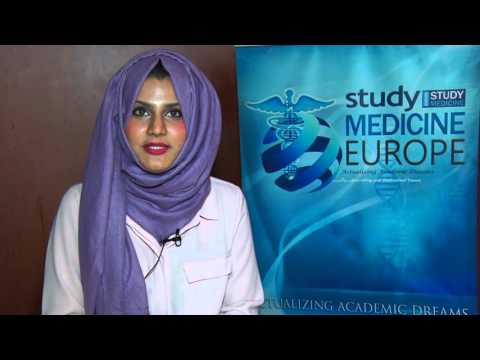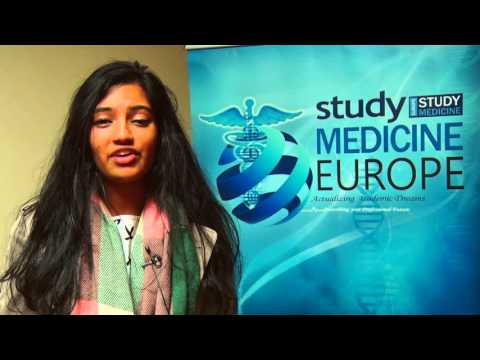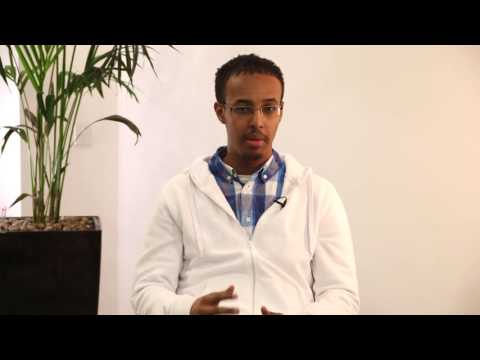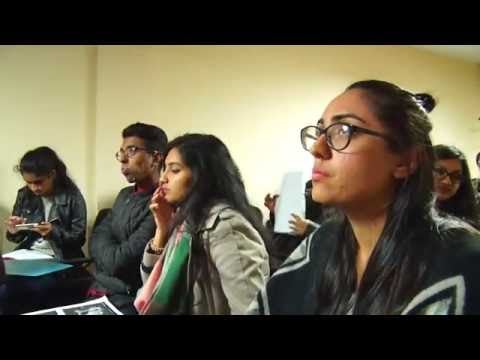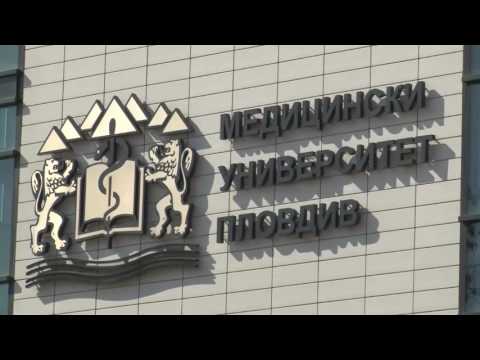Studying Medicine in Bulgaria: Quick Facts
Admission
Exams in Biology & Chemistry
Tuition fees
From €7,500/year
Undergraduate Entry
6 Years
Intake
October & February
Funding
Not Available
Graduate Entry
Not Available
Bulgarian Universities to Study Medicine in English:
+
 Why Study Medicine in Bulgaria?
Why Study Medicine in Bulgaria?
- Medicine programmes taught in English making studies easy for UK and international students.
- Affordable, world-class programmes with tuition fees more than 30% cheaper versus UK tuition fees — Bulgarian medicine programmes start at €7,500 per year.
- Bulgarian medical degrees are globally recognised, including by the UK’s General Medical Council.
- Quality of life for students is easier with living costs 46.9% lower than the UK and among the lowest in the EU.
- Bulgaria became an EU member in 2007 making it easily accessible with connections to the EU, UK, and Middle East.
- Seven accredited world-class medical schools to choose from with varied locations for studying medicine: the capital of Sofia, charming regional cities, and historic coastal cities.
- Safe, vibrant university campuses with cutting-edge facilities, partnerships with modern local and university hospitals, and multicultural, welcoming faculty.
+
 Best Medical Schools in Bulgaria to Study in English
Best Medical Schools in Bulgaria to Study in English
- Sofia Medical University (SMU) is one of the largest and most prestigious educational and scientific centres in Bulgaria and in the Balkan Peninsula.
- Since founding in 1950, SMU has been a medical training leader of progressive, inclusive education in Bulgaria and Europe.
- Students can study 6-year medicine programmes starting at €9,000 per year and 6-year dentistry programmes starting at €9,000 per year.
- The entire SMU curriculum is taught in English and students can learn the Bulgarian language through on-campus classes.
- SMU’s campus is located in central Sofia, with 4 schools and 1 administrative department in close proximity to teaching hospitals.
- Students can base themselves in the heart of Sofia or choose affordable suburban rental apartments easily accessed via public transport.
- SMU has a strong international alumni community with more than 60,000 graduates practising medicine in Bulgaria and around the world.
- SMU is an easy 3-hour flight from the UK to Sofia then a €35 taxi to the city centre.
- Entry to SMU is highly competitive and students are required to pass entry exams in biology and chemistry.
- Sofia University “St Kliment Ohridski” (SU) was founded in 1888 and is the oldest university in Bulgaria.
- The Faculty of Medicine was founded in 1917 making it Bulgaria’s first higher medical school and the cradle of modern medical education.
- 6-year medicine programmes start at €7,700 per year and are taught in English at SU’s modern preclinical and clinical medical complexes.
- The Faculty of Medicine is made up of seven departments and students can pursue postgraduate clinical specialisations on-campus.
- The sprawling campus is located in Sofia’s central east and its historic architecture houses laboratories, science, and technology research centres.
- SU students can find great living options around the university that’s simple thanks to nearby metro stations and bus stops.
- International students are part of SU’s culture of international relations that comprises European, American, and Asia-Pacific collaborations, and ERASMUS+.
- Travelling to SU is simple for UK and international students; it’s around a 3-hour direct flight from the UK to Sofia then taxis are an affordable €35 into the city.
- Entry to the English language medicine programme is limited with candidates required to pass both chemistry and biology exams.
- Burgas University “Prof. Dr. Asen Zlatarov” (BTU) is one of Bulgaria’s oldest universities and sets the highest standard for state tertiary education.
- Since 1963, the multidisciplinary institution has been foremost in Bulgarian education and its modern Medical College is a European leader.
- Taught in English, the 6-year medical programme is €10,000 per year and students study on-campus in Burgas.
- BTU is the foremost medical school in South-Eastern Bulgaria and its faculty of medicine pursues modern educational policies for global medical practice.
- All pre-clinical and clinical modules incorporate state-of-the-art training, research, and technologies to prepare students for an international career.
- Over 300 faculty specialise in theoretical teaching and scientific research delivering programmes across six academic buildings and BTU’s Central Library.
- BTU is an idyllic experience for international students with affordable accommodation close to campus, a bikeable city, and coastal views.
- As one of the largest cities and the main port in Bulgaria, Burgas is well-connected with an international airport and regional trains and buses. Students can fly nonstop from the UK in 3.5 hours, then take a €20 taxi in 25 minutes to Burgas centre.
- Applicants must comprehensively pass entry exams in Biology and Chemistry — there may be online test options — and the BTU programme is in global demand.
- Trakia University is situated in Stara Zagora where its main campus and university hospital are located in central Bulgaria.
- It is highly ranked and accredited among Bulgaria’s universities and teaching standards have been internationally acclaimed since founding in 1995.
- Trakia University offers 6-year medicine programmes starting at €7,500 per year and 5.5-year veterinary programmes starting at €5,100 per year.
- Students study in English with clinical training and work experience in Bulgarian hospitals, regional centres, NGOs, and corporate internships.
- Trakia University’s medical department comprises a university hospital, 20 research labs and 16 diagnostic clinics equipped with the latest facilities.
- A massive, newly-opened library boasts over 300,000 volumes of specialised literature and digital titles.
- Although Trakia University has some dormitory options available to students, Stara Zagora’s local rentals offer student lifestyle benefits very affordably.
- Despite its regional location, students enjoy a range of international transport links with 3-hour UK to Sofia flights. Then students can travel via train, bus or private taxi to Stara Zagora.
- The medical programme receives high numbers of applicants; students should be prepared for competitive entry with biology and chemistry exams.
- Plovdiv Medical University (MU-P) is a modern public university in Plovdiv, the second-largest city of Bulgaria.
- Founded in 1945, MU-P has an enduring higher medical educational ethos of sequential training that rigorously prepares prospective doctors.
- Students are offered 6-Year medicine programmes for €9,000 per year and 6-year dentistry programmes for €9,000 per year.
- The university’s “St. George Academic Hospital” exceeds 1,200 beds and it employs more than 130 renowned professors and about 600 deputy and assistant professors.
- MU-P’s library boasts 170,000 volumes and the university publishes the quarterly “Folia Medica”, one of the most respected medical magazines in Bulgaria.
- The annual “Youth & Science” competition under the Youth Scientific Association is an opportunity to contribute to the medical research field.
- MU-P is a comfortable learning environment for students with on-campus dormitories or plenty of local apartments for rent.
- Students can catch direct 3.5-hour flights from the UK, then it’s a 30-minute taxi for €10 to downtown.
- MU-P is an in-demand medical school for international students and applicants must pass biology and chemistry entrance exams.
- Varna Medical University (MU-V) offers the finest educational setting and medical facilities in Northeast Bulgaria.
- Since founding in 1961, more than 8,351 Bulgarian students from 45 different countries have graduated.
- English-language courses are the 6-Year medicine programmes for €9,000 per year and 6-year dentistry programmes for €9,000 per year.
- MU-V is fully accredited with students trained across its four schools: Medicine, Dentistry, Pharmacy, and Public Health.
- The university employs more than 18 professors, 78 deputy professors, and 284 assistant professors.
- There are 4 teaching hospitals associated with the university and its campus enjoys a prominent place in the heart of the city of Varna.
- Students from over 50 countries are drawn to the serene yet influential university and they enjoy on-campus and off-campus accommodations.
- Varna has an international airport and it’s only a 3.3-hour direct flight from the UK. Upon arrival it’s only €10 for a 15-minute cab ride to central Varna.
- MU-V is one of Bulgaria’s best medical schools and attracts thousands of international students, and students must sit biology and chemistry entry exams.
- Pleven Medical University (MU-Pleven) is a leading university specialising in medical studies for medicine, public health, health care, pharmacy, and medical college.
- Founded in 1974, MU-Pleven is a self-administrated public university and a leader in modern Bulgarian medical education.
- Students are able to study the following programmes in English: 6-year medicine for €8,500 per year.
- MU-Pleven is a foremost tertiary educator of undergraduate, postgraduate, and research students with 60 highly trained professors and 300 assistant professors.
- The university includes a teaching hospital with more than 1,000 beds and a vast number of specialised clinics and state-of-the-art research units.
- The university library has amassed more than 74,000 volumes of medical bibliography in Bulgarian and English and is still growing.
- On-campus dorms at MU-Pleven are a pleasant part of student life and it’s only a 10-minute walk to the city’s charming downtown.
- Students enjoy straightforward travel to Pleven with a direct 3-hour flight from the UK to Sofia, then a train, bus, or car ride of around three to six hours.
- Students must be prepared for a competitive application process for MU-Pleven and to pass compulsory entrance exams in biology and chemistry.
+
 Bulgaria Medicine Entry Requirements
Bulgaria Medicine Entry Requirements
Candidates are required to submit the following documents:
- Completed application form including brief biographical data, educational history and any courses for which the candidate is applying
- Copy of a diploma confirming completion of secondary education, with an academic transcript stating the disciplines studied
- Document issued by relevant authorities which certifies the right to continue education in higher schools and universities in the country of origin of the secondary school attended by the candidate
- Health certificate issued no more than one month prior to application and verified in the country from which the candidate is applying
- Two 4-5cm photographs
- Medicine programme candidates for Bulgaria must sit entrance exams in Biology and Chemistry
- Students from both EU and non-EU countries must also apply for their Bulgarian Student Visa (prior to arrival) and Bulgaria Student Residence Permit (applied for in Bulgaria).
+
 How is Bulgarian Medical School Structured?
How is Bulgarian Medical School Structured?
Bulgarian medicine programmes are a fantastic opportunity for UK and international students to affordably receive a world-class medical education.All seven Bulgarian universities offer 6-year medicine programmes completed in a curriculum of:
- Pre-clinical modules
- Comprising: theoretical foundation knowledge on-campus and with online study options available
- Duration: around 2 to 3 years
- Clinical modules
- Comprising: clinical modules undertaken in Bulgarian hospitals, medical clinics, and specialist centres with professors and clinicians
- Duration: around 2 to 3 years
- Internship
- Comprising: further medical rotations according to preference availability
- Duration: around one year
- State examinations
- Passed in order to receive their Doctor of Medicine (MD) degree
- Sofia Medical University
- SMU offers 6-year medicine programmes.
- The first two years of the programme focus on pre-clinical study and theory, with the following three years concentrated mainly on clinical study. In the last year, an internship has to be completed.
- Sofia University “St Kliment Ohridski”
- SU offers 6-year medicine programmes.
- The Medicine course is 6 years; the first 2 years of the programme focuses on pre-clinical study and theory, with years 3-5 concentrated pri-marily on clinical study. The final year of the course is an internship year consisting of 310 days of medical rotations prior to graduating.
- Burgas University “Prof. Dr. Asen Zlatarov”
- BTU offers 6-year medicine programmes.
- The first five years of undergraduate medicine are taught on-campus with pre-clinical modules and clinical rotations. Then in the final year of the programme, students complete a pre-graduation internship with spe-cialist rotations and state examinations.
- Trakia University – Stara Zagora
- Trakia University offers 6-year medicine programmes.
- The first two years of the programme focuses on pre-clinical study and theory with the next three years concentrated on clinical study. During the last year, students have to complete an internship year.
- Plovdiv Medical University
- MU-Plovdiv offers 6-year medicine programmes.
- During the first two years of the course students can study pre-clinical modules with the following three years concentrated mainly on clinical modules in teaching hospitals. The final year of the course is an internship year.
- Varna Medical University
- MU-V offers 6-year medicine programmes.
- The course is broken down into two years of pre-clinical studies, three years of clinical studies, and one year of an internship.
- Pleven Medical University
- MU-Pleven offers 6-year medicine programmes.
- The course is typically structured in to 2 years of pre-clinical study, 3 years of clinical studies, and an internship year of clinical rotations before graduation.
+
 Graduate Entry Medicine in Bulgaria
Graduate Entry Medicine in Bulgaria
- Bulgaria does not offer graduate entry medicine programmes.
- Caribbean universities offer the best graduate medicine programmes currently available for UK and international students.
- Graduate medicine at Caribbean medical schools is:
- Affordable with straightforward applications
- Taught entirely in English
- World-class education and curriculum in line with Europe and North America
- Degree recognition for existing qualifications and prior studies
- Global qualification and professional networks
+
 How Much Does it Cost to Study Medicine in Bulgaria?
How Much Does it Cost to Study Medicine in Bulgaria?
- Medical programmes in Bulgaria are highly affordable for international students and tuition fees start as low as €7,500 per year.
- Even with these lower tuition fees compared to UK medical schools, programmes are taught in modern university facilities and hospitals.
| Bulgarian Medical School | Tuition Fee (€) | Course Length |
|---|---|---|
| Sofia Medical University | €9,000/year | 6 Years |
| Sofia University “St Kilment Ohridski” | €7,700/year | 6 Years |
| Burgas University “Prof. Dr. Asen Zlatarov” | €10,000/year | 6 Years |
| Trakia University – Stara Zagora | €7,500/year | 6 Years |
| Plovdiv Medical University | €9,000/year | 6 Years |
| Varna Medical University | €9,000/year | 6 Years |
| Pleven Medical University | €8,500/year | 6 Years |
- Student costs of living in Bulgaria are very reasonable for areas including rent, utilities, groceries, entertainment, health insurance, and transport.
- Prices may vary between the capital city of Sofia, regional cities, and coastal cities.
- Students can expect that prices for certain luxury goods such as perishable imported food and branded items may be higher than the UK.
| City (Monthly expenses) | Rent | Food | Utilities | Health Insurance | Transportation | Total |
|---|---|---|---|---|---|---|
| Sofia | €380 | €150–€200 | €100 | €28–€38 | €25 | €683–€843 |
| Burgas | €270 | €130–€180 | €75 | €28–€38 | €25 | €528–€588 |
| Stara Zagora | €155 | €130–€180 | €75 | €28–€38 | €31 | €419–€479 |
| Plovdiv | €260 | €130–€180 | €72 | €28–€38 | €25 | €515–€575 |
| Varna | €315 | €150–€200 | €90 | €28–€38 | €23 | €606–€666 |
| Pleven | €260 | €140–€190 | €90 | €28–€38 | €29 | €547–€607 |
+
 What’s it Like to Live and Study in Bulgaria?
What’s it Like to Live and Study in Bulgaria?
- Bulgaria is vibrant and rich in traditional culture, modern attractions, and a welcoming, passionate population of 7.5 million people.
- Since joining the EU in 2007, Bulgaria’s local growth and rise in international prominence means infrastructure is constantly advancing.
- Despite its low cost of living, particularly compared to other EU member states, Bulgaria is uniquely located in the heartland of the Balkans with proximity to the Caucasus, Middle East, and Eastern Europe, which makes it an enriching and inspiring learning environment for students.
- The capital city of Sofia has a thriving economy, is home to 1.2 million people, and is cosmopolitan yet historic. Due to its international airport, students can easily fly into Bulgaria then affordably travel to other cities. Alternatively students can make Sofia their medical school base with two renowned medical schools in the capital.
- Because Bulgaria has deep roots in tertiary education, its universities are considered among the finest in Europe and students enjoy well-established campuses, living infrastructure, clubs, and entertainment.
- For students, there are endless options for balancing their study commitments with enjoying the Bulgaria’s singular offerings for adventure in the mountains, exploring the stunning Black Sea coastline, and soaking up the delicious local cuisine.
- Whether it’s snow resorts in winter and hiking in summer, or festivals and international overland trips to Turkey, Romania, Serbia, and North Macedonia, students will adore this intriguing country and never get bored.
+
 How Safe is Bulgaria for International Students?
How Safe is Bulgaria for International Students?
- When it comes to health and safety, Bulgaria is a country where UK and international students can feel at ease.
- Bulgaria is a peaceful, hospitable nation where locals and international visitors report feeling comfortable and having peace of mind in public.
- Overall Bulgaria’s safety index has risen over the past decade and students are simply encouraged to exercise standard safety precautions.
- Specifically students are recommended not to walk around at night in underpopulated, poorly lit areas and to always secure belongings.
+
 Who is Study Medicine Europe, and Why Should You Apply to Bulgaria Medical Schools With Us?
Who is Study Medicine Europe, and Why Should You Apply to Bulgaria Medical Schools With Us?
- Study Medicine Europe has over 15 years of success stories helping UK and international students find their dream medical programmes.
- SME are authorised recruiters for medical schools in Europe and the Caribbean helping UK and international students find medical programmes.
- Their local and international services deliver personalised care for students at every stage of studying medicine in Europe.
- SME support services are extensive covering applications, relocations, programmes, and post-graduate needs in the UK, Europe, and the Caribbean.
Watch Our Videos
Real Success StoriesOpen DaysEntry ExamsNetworking Events
Reviews
+ 2023
2023
+ 2022
2022
+ 2021
2021
+ 2020
2020
+ 2019
2019
+ 2018
2018
+ 2017
2017
+ 2016
2016
+ 2015
2015
+ 2014
2014









